| Listing 1 - 10 of 11 | << page >> |
Sort by
|
Book
ISBN: 1108610129 1108669719 1108693911 1108456235 9781108456234 9781108610124 Year: 2019 Publisher: Cambridge, England : Cambridge University Press,
Abstract | Keywords | Export | Availability | Bookmark
 Loading...
Loading...Choose an application
- Reference Manager
- EndNote
- RefWorks (Direct export to RefWorks)
This Element aims to present an outline of mathematics and its history, with particular emphasis on events that shook up its philosophy. It ranges from the discovery of irrational numbers in ancient Greece to the nineteenth- and twentieth-century discoveries on the nature of infinity and proof. Recurring themes are intuition and logic, meaning and existence, and the discrete and the continuous. These themes have evolved under the influence of new mathematical discoveries and the story of their evolution is, to a large extent, the story of philosophy of mathematics.
Mathematics --- Philosophy --- Logic of mathematics --- Mathematics, Logic of --- Philosophy. --- History. --- Mathematics - Philosophy - History
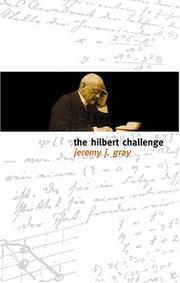
ISBN: 0198506511 9780198506515 Year: 2000 Publisher: Oxford: Oxford university press,
Abstract | Keywords | Export | Availability | Bookmark
 Loading...
Loading...Choose an application
- Reference Manager
- EndNote
- RefWorks (Direct export to RefWorks)
Mathematics --- Mathematicians --- Philosophy --- History --- Hilbert, David, --- Influence. --- Mathematics - Philosophy - History - 20th century. --- Mathematics - History - 20th century. --- Mathematicians - Germany - Biography.
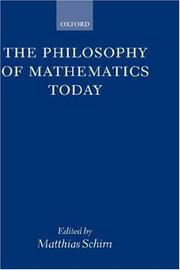
ISBN: 0198236549 9780198236542 Year: 1998 Publisher: Oxford Clarendon
Abstract | Keywords | Export | Availability | Bookmark
 Loading...
Loading...Choose an application
- Reference Manager
- EndNote
- RefWorks (Direct export to RefWorks)
Mathematics --- Philosophy --- History --- Congresses --- -Math --- Science --- -History --- -Mathematics --- Congresses. --- -Philosophy --- -Science --- Math --- Philosophy&delete& --- History&delete& --- 20th century --- Mathematics - Philosophy - History - 20th century - Congresses
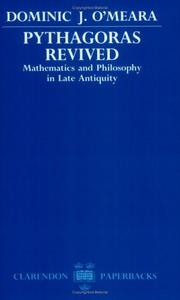
ISBN: 0198244851 0198239130 0191600938 1282051970 9786612051975 0191519804 9780191519802 9780191600937 9780198239130 9780198244851 6612051973 9781282051973 Year: 1989 Publisher: Oxford [England] : New York : Clarendon Press ; Oxford University Press,
Abstract | Keywords | Export | Availability | Bookmark
 Loading...
Loading...Choose an application
- Reference Manager
- EndNote
- RefWorks (Direct export to RefWorks)
This title examines the Pythagorean idea that number is the key to understanding reality, describing first the Pythagorean interests of Platonists in the second and third centuries and then Iamblichus's programme to Pythagoreanize Platonism in the fourth century in his work 'On Pythagoreanism'.
Pythagoras and Pythagorean school. --- Mathematics --- Philosophy --- History. --- -Pythagoras and Pythagorean school --- Math --- -History --- Pythagoras and Pythagorean school --- Philosophy, Ancient --- Science --- Philosophy&delete& --- History --- Pythagorisme --- Mathématiques --- Philosophie --- Histoire --- Mathematics - Philosophy - History.
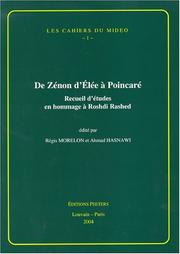
ISBN: 9042914955 2877238075 9789042914957 Year: 2004 Volume: 1 Publisher: Louvain Peeters
Abstract | Keywords | Export | Availability | Bookmark
 Loading...
Loading...Choose an application
- Reference Manager
- EndNote
- RefWorks (Direct export to RefWorks)
Geschiedenis van de wetenschappen --- Histoire des sciences --- Huldeboeken --- Mélanges --- Rashed, Roshdi --- Science --- Mathematics --- Philosophy --- Mathematics, Arab --- History --- Philosophy. --- Mathematics, Arab. --- History. --- Natural science --- Science of science --- Sciences --- Mental philosophy --- Humanities --- Math --- Arab mathematics --- Mathematics, Arabic --- Philosophy&delete& --- Natural sciences --- Science - Philosophy - History --- Science - History --- Mathematics - Philosophy - History --- Mathematics - History
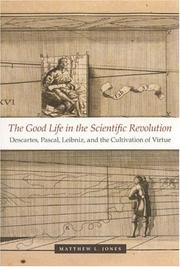
ISBN: 9780226409559 0226409546 0226409554 9780226409542 Year: 2006 Publisher: Chicago : University of Chicago Press,
Abstract | Keywords | Export | Availability | Bookmark
 Loading...
Loading...Choose an application
- Reference Manager
- EndNote
- RefWorks (Direct export to RefWorks)
Amid the unrest, dislocation, and uncertainty of seventeenth-century Europe, readers seeking consolation and assurance turned to philosophical and scientific books that offered ways of conquering fears and training the mind& guidance for living a good life. 'The Good Life in the Scientific Revolution' presents a triptych showing how three key early modern scientists, Rene; Descartes, Blaise Pascal, and Gottfried Leibniz, envisioned their new work as useful for cultivating virtue and for pursuing a good life. Their scientific and philosophical innovations stemmed in part from their understanding of mathematics and science as cognitive and spiritual exercises that could create a truer mental and spiritual nobility. In portraying the rich contexts surrounding Descartes' geometry, Pascal's arithmetical triangle, and Leibniz's calculus, Matthew L. Jones argues that this drive for moral therapeutics guided important developments of early modern philosophy and the Scientific Revolution.
Mathematics --- Science --- Philosophy --- History --- Moral and ethical aspects. --- Descartes, Rene. --- Descartes, René. --- Leibniz, Gottfried Wilhelm. --- Mathematics. --- Mathematics - Philosophy - History - 17th century. --- Pascal, Blaise. --- Science - History - 17th century. --- Science - Moral and ethical aspects. --- Science. --- Physical Sciences & Mathematics --- Sciences - General --- Moral and ethical aspects --- Descartes, René, --- Pascal, Blaise, --- Leibniz, Gottfried Wilhelm,
Book
ISSN: 12659835 ISBN: 9782738122032 2738122035 Year: 2008 Publisher: Paris : O. Jacob,
Abstract | Keywords | Export | Availability | Bookmark
 Loading...
Loading...Choose an application
- Reference Manager
- EndNote
- RefWorks (Direct export to RefWorks)
Comment les mathématiques, pure création de l'esprit humain, peuvent-elles s'appliquer au monde réel qui nous entoure ? Comment les géométries non euclidiennes, nées de spéculations abstraites, peuvent-elles décrire l'atome ou l'Univers ? Comment la pure logique du calcul des probabilités peut-elle servir à établir les lois de la physique ou les statistiques des assurances ? Ce sont ces questions qu'affronte dans l'entre-deux guerres l'empirisme logique, ce grand courant du rationalisme européen qui suscite aujourd'hui un intérêt nouveau. Ses grandes figures, Carnap, Schlick. Reichenbach et quelques autres, ont été des penseurs très différents et profondément originaux. La philosophie des sciences contemporaine a encore de nombreuses leçons à tirer de leurs innovations conceptuelles et de leurs débats internes, mais aussi de la réflexion sur les limites de leur démarche et sur les obstacles qu'ils ont rencontrés.
Mathematics --- Logical positivism --- Philosophy --- History --- Mathematics - Philosophy - History - 20th century - Congresses --- Logical positivism - History - 20th century - Congresses --- Philosophie et mathématiques --- Positivisme logique --- Philosophie et sciences --- Logique symbolique et mathématique --- Congrès --- Philosophie et mathématiques --- Logique symbolique et mathématique --- Congrès
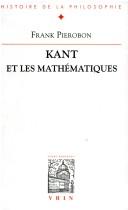
ISBN: 2711616452 9782711616459 Year: 2003 Publisher: Paris Vrin
Abstract | Keywords | Export | Availability | Bookmark
 Loading...
Loading...Choose an application
- Reference Manager
- EndNote
- RefWorks (Direct export to RefWorks)
La conception qu’Emmanuel Kant se faisait des mathématiques était en parfaite consonance avec l’opinion philosophique la plus courante au XVIIIe siècle à l’égard de cette science. Il conviendrait par conséquent de tenir davantage compte de l’histoire des idées scientifiques, ce qui permettrait de faire remarquer que la pensée kantienne relève d’un paradigme scientifique plus ancien, celui de la géométrie euclidienne (où l’image reste intimement articulée au signe), alors que les critiques ordinairement adressées au Kant mathématicien s’appuient indirectement sur l’héritage de la révolution algébrique par lequel le signe est désormais dissocié de l’image. Il convenait donc d’examiner dans le plus grand détail la manière dont, à travers son œuvre, Kant recevait et discutait les conceptions mathématiques de son temps, et en particulier la tension marquée entre la géométrie et l’arithmétique. Ce faisant, il redevient possible de recontextualiser le concept kantien d’intuition par rapport aux évidences de son temps, qui ne sont plus tout à fait les nôtres. Les réticences de Kant vis-à-vis des concepts les plus problématiques de l’algèbre se laissent ainsi interpréter à nouveaux frais, faisant ressortir la signification de l’architectonique.
Mathematics --- Kant, Immanuel --- Philosophy, German --- Mathématiques --- Philosophie allemande --- Philosophy --- History --- Philosophie --- Histoire --- Kant, Immanuel, --- Knowledge --- Mathematics. --- Mathématiques --- Math --- Science --- Kant, Emmanuel --- Kant, Emanuel --- Kant, Emanuele --- Kant, I. --- Kānt, ʻAmmānūʼīl, --- Kant, Immanouel, --- Kant, Immanuil, --- Kʻantʻŭ, --- Kant, --- Kant, Emmanuel, --- Ḳanṭ, ʻImanuʼel, --- Kant, E., --- Kant, Emanuel, --- Cantơ, I., --- Kant, Emanuele, --- Kant, Im. --- קאנט --- קאנט, א. --- קאנט, עמנואל --- קאנט, עמנואל, --- קאנט, ע. --- קנט --- קנט, עמנואל --- קנט, עמנואל, --- كانت ، ايمانوئل --- كنت، إمانويل، --- カントイマニユエル, --- Kangde, --- 康德, --- Kanṭ, Īmānwīl, --- كانط، إيمانويل --- Kant, Manuel, --- Mathematics - Philosophy - History - 18th century.
Book
ISBN: 2251181024 9782251181028 Year: 2005 Volume: 3 Publisher: Paris: Les Belles Lettres,
Abstract | Keywords | Export | Availability | Bookmark
 Loading...
Loading...Choose an application
- Reference Manager
- EndNote
- RefWorks (Direct export to RefWorks)
Dieu--Philosophie --- Filosofische theologie --- God--Filosofie --- Godsleer [Wijsgerige ] --- Infini --- Infinite --- Infiniteit --- Infinity --- Oneindigheid --- Philosophical theology --- Theologie [Filosofische ] --- Theology [Philosophical ] --- Théologie philosophique --- Unendlichkeit --- Wijsgerige godsleer --- Wijsgerige theologie --- Philosophy and religion --- Scholasticism --- Philosophie et religion --- Scolastique --- Early works to 1800 --- Ouvrages avant 1800 --- God (Christianity) --- Mathematics --- History --- History of doctrines --- Philosophy --- Mediaeval Philosophy --- 14th Century --- Theology and Mathematics --- Dieu --- Mathématiques --- Philosophie et théologie --- Infinité --- Histoire des doctrines --- Philosophie --- Histoire --- Theology and Mathematics. --- Early works to 1800. --- Math --- Science --- Finite, The --- God --- Infinite - History - To 1500 --- God (Christianity) - History of doctrines - Middle Ages, 600-1500 --- Mathematics - Philosophy - History - Middle Ages, 600-1500 --- Théologie et philosophie --- 14e siècle --- Aspect religieux
Book
ISBN: 1402089252 9048180295 9786611913533 1281913537 1402089260 Year: 2009 Publisher: Dordrecht ; London : Springer,
Abstract | Keywords | Export | Availability | Bookmark
 Loading...
Loading...Choose an application
- Reference Manager
- EndNote
- RefWorks (Direct export to RefWorks)
The period in the foundations of mathematics that started in 1879 with the publication of Frege's Begriffsschrift and ended in 1931 with Gödel's Über formal unentscheidbare Sätze der Principia Mathematica und verwandter Systeme I can reasonably be called the classical period. It saw the development of three major foundational programmes: the logicism of Frege, Russell and Whitehead, the intuitionism of Brouwer, and Hilbert's formalist and proof-theoretic programme. In this period, there were also lively exchanges between the various schools culminating in the famous Hilbert-Brouwer controversy in the 1920s. The purpose of this anthology is to review the programmes in the foundations of mathematics from the classical period and to assess their possible relevance for contemporary philosophy of mathematics. What can we say, in retrospect, about the various foundational programmes of the classical period and the disputes that took place between them? To what extent do the classical programmes of logicism, intuitionism and formalism represent options that are still alive today? These questions are addressed in this volume by leading mathematical logicians and philosophers of mathematics. The volume will be of interest primarily to researchers and graduate students of philosophy, logic, mathematics and theoretical computer science. The material will be accessible to specialists in these areas and to advanced graduate students in the respective fields.
Intuitionistic mathematics. --- Mathematics -- Philosophy -- History. --- Mathematics. --- Intuitionistic mathematics --- Mathematics --- Mathematical Theory --- Physical Sciences & Mathematics --- History --- Philosophy --- History. --- Math --- Epistemology. --- Logic. --- Ontology. --- Language and languages --- Mathematical logic. --- Mathematical Logic and Foundations. --- Philosophy of Language. --- History of Mathematical Sciences. --- Philosophy. --- Science --- Constructive mathematics --- Logic, Symbolic and mathematical. --- Linguistics --- Genetic epistemology. --- Argumentation --- Deduction (Logic) --- Deductive logic --- Dialectic (Logic) --- Logic, Deductive --- Intellect --- Psychology --- Reasoning --- Thought and thinking --- Being --- Metaphysics --- Necessity (Philosophy) --- Substance (Philosophy) --- Algebra of logic --- Logic, Universal --- Mathematical logic --- Symbolic and mathematical logic --- Symbolic logic --- Algebra, Abstract --- Metamathematics --- Set theory --- Syllogism --- Developmental psychology --- Knowledge, Theory of --- Methodology --- Language and languages—Philosophy. --- Annals --- Auxiliary sciences of history --- Epistemology --- Theory of knowledge
| Listing 1 - 10 of 11 | << page >> |
Sort by
|

 Search
Search Feedback
Feedback About UniCat
About UniCat  Help
Help News
News